 MyDogBreeds
MyDogBreeds Sarplaninac is originated from Macedonia but Dunker is originated from Norway. Sarplaninac may grow 7 cm / 3 inches higher than Dunker. Sarplaninac may weigh 27 kg / 60 pounds more than Dunker. Both Sarplaninac and Dunker has almost same life span. Both Sarplaninac and Dunker has almost same litter size. Sarplaninac requires Moderate maintenance. But Dunker requires Low maintenance
Sarplaninac is originated from Macedonia but Dunker is originated from Norway. Sarplaninac may grow 7 cm / 3 inches higher than Dunker. Sarplaninac may weigh 27 kg / 60 pounds more than Dunker. Both Sarplaninac and Dunker has almost same life span. Both Sarplaninac and Dunker has almost same litter size. Sarplaninac requires Moderate maintenance. But Dunker requires Low maintenance
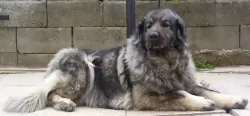 Hailing from Macedonia, the beautiful Sarplaninac dog was developed as a guardian of livestock and is large enough to fight off large predators like bears and wolves.
Hailing from Macedonia, the beautiful Sarplaninac dog was developed as a guardian of livestock and is large enough to fight off large predators like bears and wolves.
Nobody is too sure of the breeds exact origins, though it is thought that its ancestors came to the Balkan Peninsula with people migrating from ancient Asia.
This huge dog is one of the oldest native breeds from ancient Molosser breeds. The dog was recognized in 1939, and in 1954 it became known as the Yugoslav Shepherd Dog. Later the name changed and the dog was recognized by the United Kennel Club in 1995.
 Known as the Norwegian Hound, the Dunker hails from Norway. Bred and named after breeder Wilhelm Dunker to be a robust scenthound, Norwegian Scenthounds were crossed with a Russian Harlequin Hound because this particular dog was an excellent scent trailer and it could stand up to the freezing conditions of Norway.
Known as the Norwegian Hound, the Dunker hails from Norway. Bred and named after breeder Wilhelm Dunker to be a robust scenthound, Norwegian Scenthounds were crossed with a Russian Harlequin Hound because this particular dog was an excellent scent trailer and it could stand up to the freezing conditions of Norway.
The Dunker become popular in the mid-19th century in other Scandinavian countries. Hunters liked its intelligence, its robustness and its speed and strength. In 1902 a club was founded for the breed and in the same year the Norwegian Kennel Club recognized the Dunker.
The Dunker started dying out after the war, and in the late 1980s breeders of the Dunker petitioned to allow them to cross the remaining Dunkers with scenthounds. Today the dog is known in Norway but is uncommon outside Scandinavia.
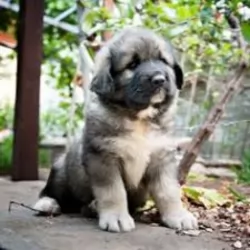 The Sarplaninac is a large, strong, fluffy dog standing at between 54 and 62cm in height and weighing between 30 and 45kg.
The Sarplaninac is a large, strong, fluffy dog standing at between 54 and 62cm in height and weighing between 30 and 45kg.
The coat of the dog is dense, coarse and of medium length. Colors are different shades of grey, white, tan and black. The head is large, the ears are fairly short but are floppy and covered with short hair. The dog is deep chested and the tail is long, often held high and covered with thick, feathery hair.
Protective, reliable, reserved, stubborn and gentle, this intelligent dog is fairly serious, and while he makes a devoted family pet, he is cool and wary of strangers.
Excellent training and socialization makes him well mannered, balanced and obedient around different people. He will tolerate children but won’t take easily to other pets in the house, capable of becoming aggressive with them.
 The Dunker is a medium sized dog which stands at between 50-55cms with females being slightly smaller at 47-52cms. They usually weigh between 11-18kg and look similar to other scenthounds, being muscular and athletic.
The Dunker is a medium sized dog which stands at between 50-55cms with females being slightly smaller at 47-52cms. They usually weigh between 11-18kg and look similar to other scenthounds, being muscular and athletic.
The ears of the Dunker are floppy, the tail is long and carried straight with a bit of a curve, the nose is large and black as well as the eyes, but some dogs have light eyes which can even be blue.
The coat of the Dunker is straight and dense and this coat of his is well known for the unique color of the coat – blue or black dappled, while some dogs will have black, tan and white markings. White faces are preferred but you will find dogs with black masks.
This is a non-aggressive dog and can become quite friendly when trained and socialized.
They are dogs that form strong bonds with their owners, being particularly good around children. They get on well with dogs and other pets in the home.
They’re intelligent dogs and are are easy to train. In fact, training and socialization is recommended for this dog as he does tend to be a bit stubborn.
Training ensures he is relaxed and obedient. He is an active dog and will certainly require some exercise each day. He’ll respond willingly if you call him to join you in your jogging- or cycling outings.
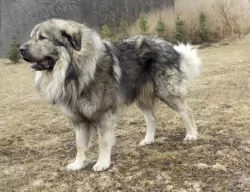 These dogs are protective, but they’re not vicious. When properly raised they are wonderful family pets.
These dogs are protective, but they’re not vicious. When properly raised they are wonderful family pets.
True, it’s a large, strong willed dog that isn’t a good choice for the first-time dog owner. They are good with children, but only children who have been taught how to treat animals with care and patience.
This dog is a powerful guardian type of dog, imposing in size, but it’s all about upbringing, and if you bring him up well then he can make a tremendous pet and companion.
 The Dunker is such a good tempered dog and he will be happy to settle in the city or the countryside with his owner.
The Dunker is such a good tempered dog and he will be happy to settle in the city or the countryside with his owner.
When you look at his history, he is a hunting dog, used for hunting rabbits. Being an active breed, he is better suited to living in a home where there is at least a fair sized garden.
He isn’t a high maintenance dog either, so no special attention to grooming is required. Being a fairly healthy breed, he isn’t likely to develop any serious health issues too. This low-maintenance, undemanding Norwegian Hound makes a splendid pet.
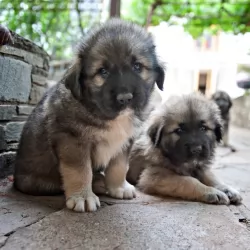 The Sarplaninac dog is a robust dog but he can suffer from health issues such as hip dysplasia, obesity, bloat, ear infections and skin allergies.
The Sarplaninac dog is a robust dog but he can suffer from health issues such as hip dysplasia, obesity, bloat, ear infections and skin allergies.
When your dog gazes up at you with such love in his eyes, don’t be tempted to pop some chocolate into his mouth or let him finish off your ice-cream. Treats like this can damage your pet’s health and give him heat intolerance, breathing difficulties, hypertension, liver disease and diabetes.
 The Dunker dog can live to reach a ripe age of 12 to 15 years. There are some health issues he may face -
The Dunker dog can live to reach a ripe age of 12 to 15 years. There are some health issues he may face -
Partial or complete hearing loss can come about because of dirt or wax build-up in the ear canals. It can be because of an untreated ear infection, an injury or even old age.
Your veterinarian can examine your dog’s ear canal. Certain dog breeds such as the Dunker and others are more predisposed to deafness and you’ll find your dog responding slowly to your voice or he may be totally startled when woken.
Your vet will determine the type of treatment for your dog if an ear infection for instance is suspected. Treatment in this case may involve cleaning wax out of the ears or getting rid of overgrown ear hair.
Hip dysplasia is an inherited condition with your dog where bone rubs against other bone. Your Dunker dog will be in pain and his movement could be limited and he may even become lame. Get your pet to the vet because there are a number of treatment options.
Take a look at your pet’s eyes so that you’re aware of cloudiness, inflammation, discharge, a change in eye color or red eyelid lining. Take him to the vet if you suspect something serious, but in the meantime you can also gently wipe over your pet’s eyes to remove any discharge.
If you do need to bath your pet, make sure to protect his eyes before applying any lotion.
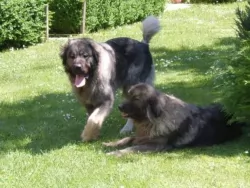 Every dog needs care from puppyhood through to old age.
Every dog needs care from puppyhood through to old age.
Šarplaninacs are looked upon as medium maintenance dogs. The coat is long and thick and requires a firm bristle brush to get their hair brushed.These dogs are moderate shedders so a brush twice a week will do the trick to keep the hair free of loose hair and matting.
Because these dogs have floppy ears, they will need to be checked and cleaned. Floppy eared dogs battle with moisture and wax build-up that increases the likelihood of ear infections.
Check the eyes that they are clear and free of discharge. Eyes with a lot of discharge can be indicative of health problems.
Check for any unusual lumps as cancer often starts with a new lump.
Provide your pet with a nice warm, dry place to sleep.
Keep his vaccines up to date to prevent deadly canine diseases.
Have him or her spayed or neutered if you don’t want puppies. These are regular procedures for a vet and offers health benefits for the dog. Neutering a male improves his character and keeps him from roaming. These dogs are capable of having 3 – 8 puppies.
The Sarplaninac requires decent food if he is to remain healthy. Dog’s stomachs can become upset if they eat all kinds of sweet and spicy human foods.
Commercially manufactured dog food is a good backup food to have because of its convenience. Try to include some home-made food. Simply add into one big pot chicken, brown rice or pasta and spinach, sweet potatoes and carrots. This food can all be chopped up and added in to the dry kibble twice a week. Give this to your pet twice a week and see how his tails wags when he smells it.
Also try to add in some raw meat to his food occasionally.
Ensure there is always a bowl of fresh, cool water within his reach.
 The Dunker is a dog with stamina and energy and he will need a walk every day as well as some other forms of vigorous exercise. The idea is to involve a dog like this in all your activities, whether you go running, swimming or cycling.
The Dunker is a dog with stamina and energy and he will need a walk every day as well as some other forms of vigorous exercise. The idea is to involve a dog like this in all your activities, whether you go running, swimming or cycling.
The Dunker isn’t going to require you to spend a lot of money on maintenance for him. A good brush-down twice a week will be adequate as he is a fairly heavy shedder and brushing him will get rid of all those loose hairs. It is also time to check him over for fleas and ticks too.
Other grooming aspects to check will include nail trimming, checking the inside of the dog’s ears for excess wax build-up and dirt.
Dental care is of major concern because teeth left unattended can result in mouth bacteria. This bacteria enters the blood stream and results in systemic infection. Sometimes the bad teeth can be so painful that a dog no longer wants to eat.
It is imperative to brush your pet’s teeth at least 2 or 3 times a week with a special dog toothbrush and toothpaste.